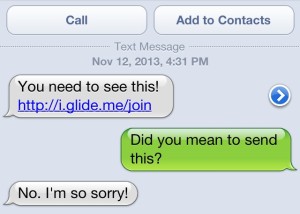Questionable phone app spams your smartphone contacts
“Glide” Video App Spammy Looking Text Sent To Customer’s Entire Address Book
 Clearly, this is a questionable phone app. A text from a random phone number with the message: “You need to see this!” and a short link to a site I should “join.” I hadn’t heard of Glide up to this point and, when I received this text, assumed it was a virus. I guess it’s not – er, technically. Of course, the sender had no idea it was spamming her contacts and apologized. It’s not all her fault though.
Clearly, this is a questionable phone app. A text from a random phone number with the message: “You need to see this!” and a short link to a site I should “join.” I hadn’t heard of Glide up to this point and, when I received this text, assumed it was a virus. I guess it’s not – er, technically. Of course, the sender had no idea it was spamming her contacts and apologized. It’s not all her fault though.
As “jeep-n-momma” reports on her blog post, the Glide app apparently tells you in the fine print that it WILL text all the contacts in your phone and ask them to join. She also points out that this process could be never-ending: “So when that happens it sends a link to your contact list with a text then those people download and get MORE text sent to contacts. It’s the never ending spam chain!”
Certainly this looks like a virus, and acts like a virus, and if it does things that you are not aware of, including texting all of your friends and their friends if they sign up, I think that fits the definition of a virus. Plus, a random text to join something called “glide” could be, well, anything – good or bad.
Of course, any time you receive a message to click on a link, you should first verify that you know what you are clicking on and who sent you the link. If not, don’t click it. Google search it and do your research. There is malware out there, for both Android and iPhone (ZDNet gives us five ways to cut down the chances of getting a phone virus.)
So, let’s go back and recap what to do in a situation like this:
First, don’t click on a text you receive with a random link – on your computer or on your phone – without first checking it out.
Second, make sure that for any app that you download, or initiate on a site like Facebook, you understand the permissions you are granting to the app. Even apps you connect with on Facebook can take control of your friends list, and many of them allow you to “skip” or bipass posting to or contacting your friends.
Glide bears responsibility here, and needs to improve their process. While the company does reference the question on their website, answering “It’s important you understand that the texts you received are invites from your friends sent out per their request from their address book. We never send them out without explicit permission.” That doesn’t cut it. This skirts responsibility and blames the user for the spamming of, what might be, thousands of personal and business contacts in a person’s phone.
Glide should make it more clear that the user can opt out of spamming their entire address book. In addition, Glide’s invite needs to explain more about their app. For example: “Your friend or contact has invited you to try the video sharing service “Glide” would be much more effective and professional than, “You need to see this!”. Besides, you have 160 characters, c’mon man, use them. It’s better marketing for you anyway. On the other hand, if your app is really that great, good old fashioned word-of-mouth will do you wonders, just look at Bitstrips.
(If anyone gets any weird links from me, please let me know. Thank you.)

Pingback:Essay: Why can you not miss out on SEO as a Growth Hacker?